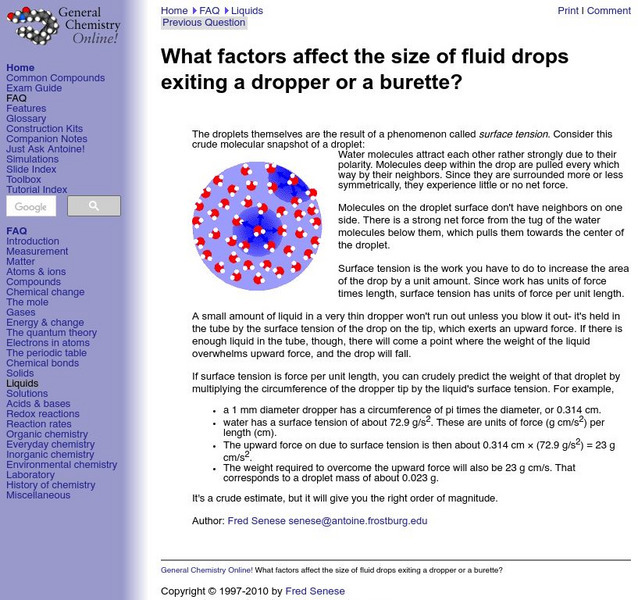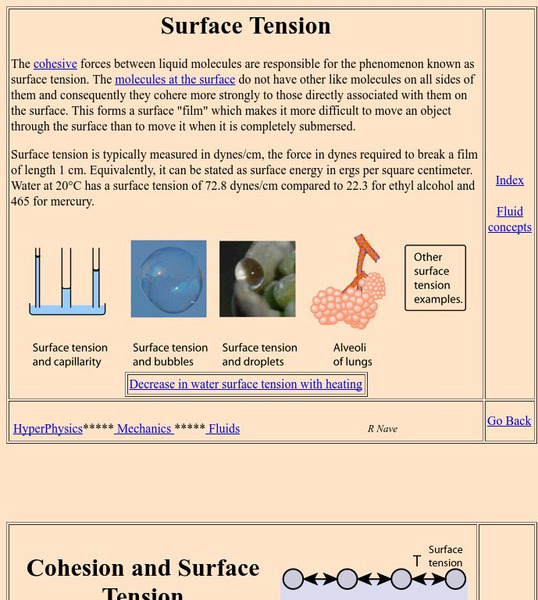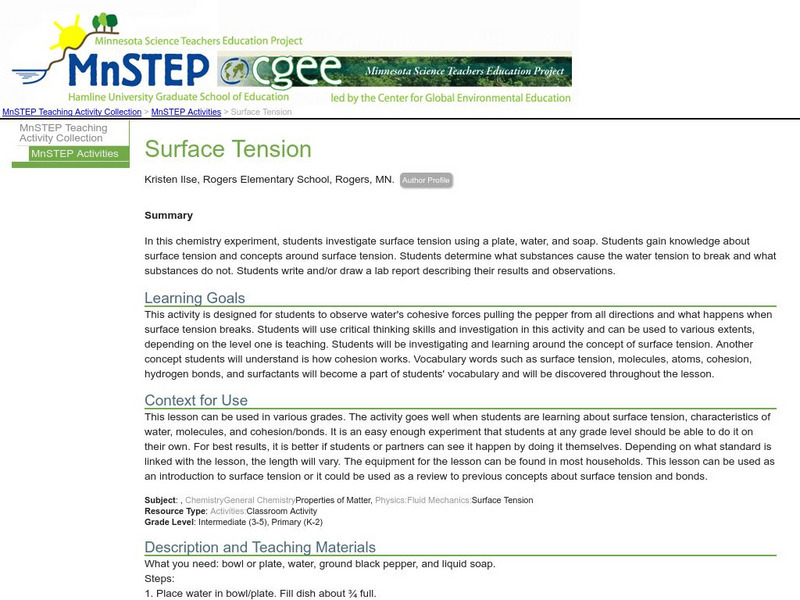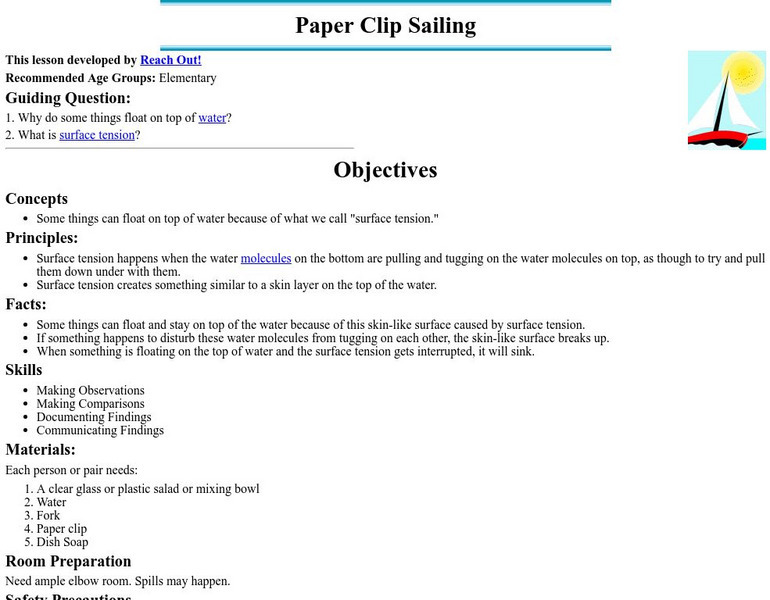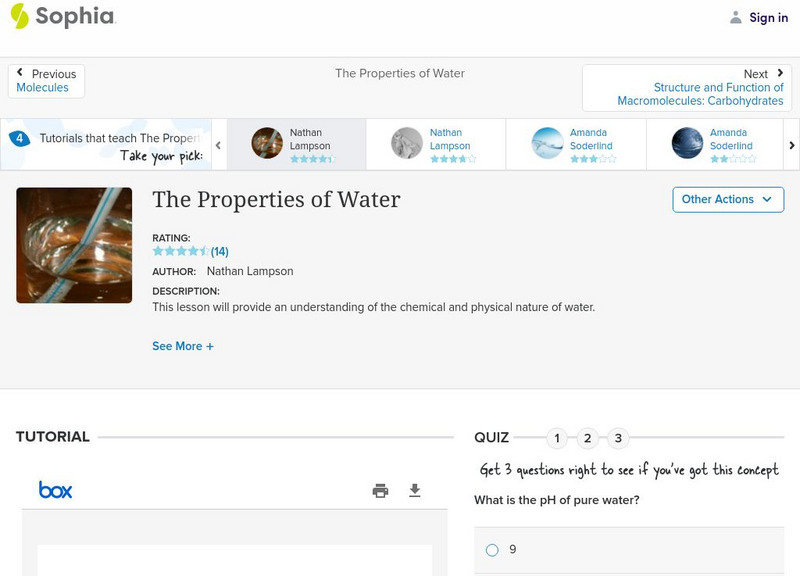Hi, what do you want to do?
Exploratorium
Exploratorium: Surface Tension
Describes and explains the concept of Surface Tension. Also provides links to related topics.
TOPS Learning Systems
Tops Learning Systems: Top Science: Water Domes [Pdf]
Investigate the cohesive tension on the surface of water.
Science Struck
Science Struck: An in Depth Comparison of Cohesion vs. Adhesion
Explains what cohesion and adhesion are; what their effects are in a liquid; what surface tension, a meniscus, and capillary action are; and gives examples of where one can observe cohesion and adhesion.
Science Struck
Science Struck: The Concept and Meaning of Capillary Action
Defines capillary action and discusses its applications. The physics of surface tension, cohesion, and adhesion are explained and a simple experiment is provided. Includes a number of examples where capillary action takes place.
Bill Nye
Bill Nye: Float Your Metal Boat
This experiment from Bill Nye shows that breaking the surface tension of a body of water can provide enough energy to propel a boat (or an insect!).
Frostburg State University
General Chemistry Online: Liquids Faq
Get the answers to many common questions about liquids. Identify properties and phase transitions of liquid shared in this FAQ.
Frostburg State University
Frostberg University: Surface Tension and Droplet Size
Discusses the role of surface tension in determining the size of water droplets. Explanation of why a small amount of liquid in a dropper will never run out.
US Geological Survey
Usgs: Capillary Action
Capillary is described and explained. It is related to surface tension. Examples in botany and human physiology are given.
Georgia State University
Georgia State University: Hyper Physics: Surface Tension
Georgia State explains, defines, and illustrates the concept of surface tension. Includes photos, examples and links to further information.
Alabama Learning Exchange
Alex: Magic Milk
This lesson is designed to engage students in a discussion and demonstration of molecules, surface tension, and bonding. Students will use hands on materials as well as technology. This lesson shows how a solution works to achieve...
Alabama Learning Exchange
Alex: Mentos, Soda, and Nucleation
In this lesson, Mentos candy and different types of soda are used to show examples of nucleation, surface tension, surface area, polar attractions, and supersaturated materials. A video will be used to show the examples and the students...
Stanford University
Stanford University: Pour It Out
Learners learn how material properties change as the size of the material decreases to the nanoscale. This lesson investigates the effects of forces at different scales.
Science Buddies
Science Buddies: Build a Bathtub Toy Raft Powered by Surface Tension
In this science activity, you will make a little toy raft that is powered by surface tension, and use your vessel to investigate how surface tension works.
Hunkins Experiments
Hunkin's Experiments: Surface Tension
Hunkin's Experiments is a group of simple cartoon illustrations of scientific principles. Some would work well in the classroom, but others have little value beyond entertaining students. All of the projects are easy to do. These two are...
Science Education Resource Center at Carleton College
Serc: Mn Step: Surface Tension
A simple experiment investigating surface tension and the cohesive property of water, using just water, pepper, and liquid soap.
Science Education Resource Center at Carleton College
Serc: Mn Step: Surface Tension With Soap Film
An investigation into the effect soap has on the surface tension of water. Learners create three-dimensional shapes using toothpicks and clay, dip them into soapy water, and make observations and formulate questions about the soap film.
Michigan Reach Out
University of Michigan: Paper Clip Sailing
Basic experiment that helps students learn about surface tension.
PBS
Pbs Teachers: Floating Paper Clips Experiment
Explore surface tension in water by making a paper clip float.
PBS
Pbs Teachers: Salt and Pepper Experiment
Demonstrate surface tension by sprinkling pepper on a bowl full of water, then touching a soapy finger to the water.
PBS
Pbs Teachers: Soap Powered Boat Experiment
Examine surface tension by floating an index card that has been cut into a boat shape on water, then dropping liquid soap near the "engine" section of the index card.
Exploratorium
Exploratorium: Adhesion
Adhesion is defined and an example is given. Adhesion is distinguished from cohesion. Examples of cohesion are stated as well. Links to pages with further information are provided.
PBS
Pbs Teachers: Scientific American: Science Safari: Fighting Malaria
Explore the issues surrounding the mosquito infestations. Investigate surface tension to explain how the egg rafts stay afloat and mosquitoes are able to stand on the water's surface, and review proper disposal of automobile tires.
Sophia Learning
Sophia: The Properties of Water: Lesson 4
This lesson will provide an understanding of the chemical and physical nature of water. It is 4 of 4 in the series titled "The Properties of Water."
Sophia Learning
Sophia: The Properties of Water: Lesson 1
This lesson will provide an understanding of the chemical and physical nature of water. It is 1 of 4 in the series titled "The Properties of Water."





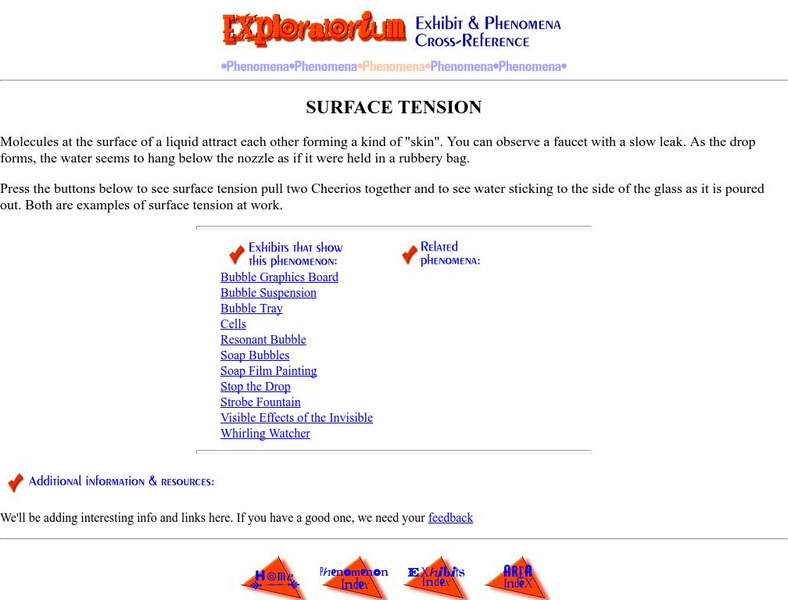
![Tops Learning Systems: Top Science: Water Domes [Pdf] Activity Tops Learning Systems: Top Science: Water Domes [Pdf] Activity](https://static.lp.lexp.cloud/images/attachment_defaults/resource/large/FPO-knovation.png)

